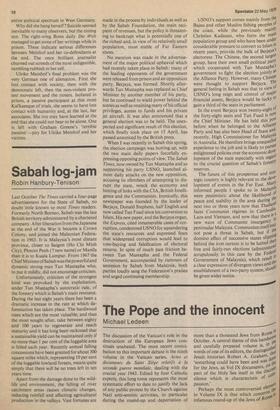Sabah log-jam
Robin Hanbury-Tenison Last October The Times carried a four-page advertisement for the State of Sabah, no doubt little known to most Times readers. Formerly North Borneo, Sabah was the last British territory administered by a chartered company. After liberation from the Japanese at the end of the War it became a Crown Colony, and joined the Malaysian Federation in 1963. It is Malaysia's most distant province, closer to Saigon (Ho Chi Minh City), Phnom Penh ( ? new name) or Manila than it is to Kuala Lumpur. From 1967 the Chief Minister of Sabah was the powerful and dynamic strong man Tun Mustapha who, to put it mildly, did not encourage criticism.
Unfortunately, criticism of the strongest kind was provoked by the exploitation, under Tun Mustapha's autocratic rule, of the forestry which is Sabah's main resource. During the last eight years there has been a dramatic increase in the rate at which deforestation has taken place. The hardwood trees which are the most valuable, and thus the most sought after, take between eighty and 100 years to regenerate and reach maturity and it has long been reckoned that a sustainable yield can be maintained only if no more than 1 per cent of the loggable area is felled each year. Recently annual felling concessions have been granted for about 300 square miles which, representing 10 per cent of the loggable lowland forests, means quite simply that there will be no trees left in ten years time.
Apart from the damage done to the wildlife and environment, the felling of river catchment areas causes climatic changes, reducing rainfall and affecting agricultural production in the valleys. Vast fortunes are made in the process by individuals as well as by the Sabah Foundation, the main recipient of revenues, but the policy is threatening to bankrupt what is potentially one of the richest and, in view of its relatively small population, most stable of Far Eastern states.
No mention was made in the advertisement of the major political upheaval which had recently taken place in Sabah: many of the leading opponents of the government were released from prison and an opposition party, Berjaya, was formed. Shortly afterwards Tun Mustapha was replaced as Chief Minister by another member of his party, but he continued to wield power behind the scenes as well as retaining many of his official privileges, access to funds and his private jet aircraft. It was also announced that a general election was to be held. The unexpected and significant result of this election, which finally took place on 15 April, has passed unnoticed by the British press.
When I was recently in Sabah this spring, the election campaign was hotting up, with the two main daily papers forcefully expressing opposing points of view. The Sabah Times, now owned by Tun Mustapha and so supporting his party USNO, launched almost daily attacks on the new opposition, accusing its Members of attempting to disrupt the state, wreck the economy and hinting of links with the CIA, British Intelligence and the Communists. Ironically, this newspaper was founded by the leader of Berjaya, Donald Stephens, half English and now called Tun Fuad since his conversion to Islam. His new paper, and the Berjaya organ, the Express, cited innumerable cases of corruption, condemned USNO for squandering the state's resources and expressed fears that widespread corruption would lead to vote-buying and falsification of electoral returns. In spite of much past friction between Tun Mustapha and the Federal Government, accompanied by rumours of secession by Sabah from Malaysia, both parties loudly sang the Federation's praises and urged continuing membership. USNO's support comes mainly front the Bajau and other Muslim fishing peoples of the coast, while the previously mainlY Christian Kadazan, who form the maul population group and who have been under considerable pressure to convert to Islam 10 recent years, provide the bulk of Berjaya 5 electorate. The Chinese, the second largest group, have their own small political partY which cooperated with Tun Mustapha s government to fight the election jointly as the Alliance Party. However, many Chinese were thought to support Berjaya. The,. general feeling in Sabah was that in view.0' USNO's long reign and cOntrol of ma.101. financial assets, Berjaya would be .luckY t° gain a third of the seats in parliament. In the event Berjaya won twenty-eight of the forty-eight seats and Tun Fuad is now the Chief Minister. He has held this P°51 before when he belonged to the Alliance Party and has also been Head of State recently, High Commissioner for MalaYs'a in Australia. He therefore brings unequalled experience to the job and is likely to pursue enlightened policies over the economic deve: lopment of the state especially with regat° to the crucial question of Sabah's forestil reserves.
The future of this prosperous and strategic country is highly relevant to the development of events in the Far East. Man.Y informed people I spoke to in MalaYslet were pessimistic about the likelihood 0' peace and stability in the area during thAe next two or three years now that Thalia°, u faces Communist regimes in Cambodia. Laos and Vietnam, and now that there Is.e new wave of Communist insurgencY 111 peninsular Malaysia. Communism itself MO not pose a threat in Sabah, but if I:11.e domino effect of successive states slipPln° behind the iron curtain is to be halted the free and fairly-run elections (administereal scrupulously in this case by the Feidera.„ Government of Malaysia), which result a clear expression of divergent views and tho establishment of a two-party system, sh°L1 be given wider notice.


































 Previous page
Previous page